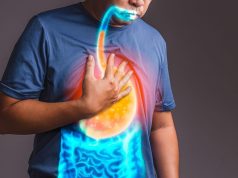For patients with severe GERD, low rates of 90- and 30-day mortality and 90-day reoperation
TUESDAY, March 29, 2016 (HealthDay News) — Mortality and reoperation rates are very low among working-age patients with severe gastroesophageal reflux disease (GERD) undergoing primary laparoscopic fundoplication, according to a study published online March 21 in the British Journal of Surgery.
John Maret-Ouda, M.D., from the Karolinska Institute in Stockholm, and colleagues conducted a population-based cohort study involving 8,947 patients with GERD (aged 18 to 65 years) who underwent primary laparoscopic fundoplication between 1997 and 2013. Absolute all-cause and surgery-related 90- and 30-day mortality was assessed as the primary outcome.
The researchers found that 6.2 percent of participants had significant comorbidity. During the study period, the annual rate of laparoscopic fundoplication decreased from 15.3 to 2.4 patients per 100,000 population. During the same time period there was more than a two-fold increase in the proportion of patients with comorbidity. The all-cause 90- and 30-day mortality rates were 0.08 and 0.03 percent, respectively, with only one death directly related to surgery (0.01 percent). The rate of reoperation within 90 days was 0.4 percent. Increased risk of prolonged hospital stay, but not reoperation, was seen in association with comorbidity and older age.
“This population-based study revealed very low mortality and reoperation rates following primary laparoscopic fundoplication in the working-age population,” the authors write. “The findings may influence clinical decision making in the treatment of severe GERD.”
Copyright © 2016 HealthDay. All rights reserved.








